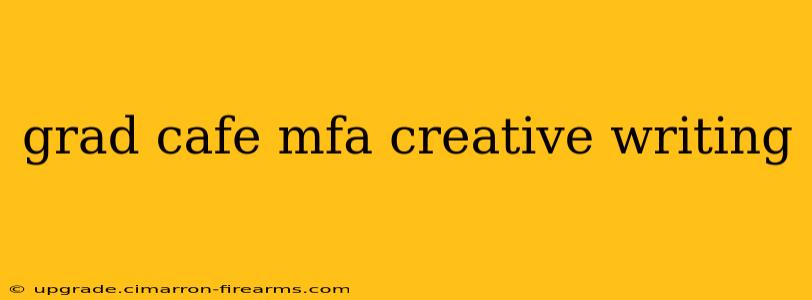Applying to an MFA Creative Writing program is a significant undertaking. The competition is fierce, and the process can feel opaque. This guide leverages the wealth of information available on GradCafe, a valuable resource for prospective graduate students, to help you navigate the application process successfully. We'll explore how to effectively utilize GradCafe for MFA Creative Writing programs and offer strategies to maximize your chances of acceptance.
Understanding GradCafe and its Role in MFA Admissions
GradCafe is a crowdsourced database where applicants share their experiences with graduate program admissions. For MFA Creative Writing hopefuls, it's an invaluable tool, offering insights into:
- Application Deadlines: GradCafe provides a centralized location to find the application deadlines for various programs, preventing you from missing crucial dates.
- Decision Timeline: Understanding the typical timeframe for admissions decisions can manage expectations and reduce anxiety. GradCafe helps you gauge when you might expect to hear back from a particular program.
- Acceptance Rates (Implicit): While not explicitly stated, the volume of acceptance and rejection reports offers a sense of the program's competitiveness. A high volume of rejections might indicate a highly selective program.
- Program Specifics (Anecdotal): Applicant comments often reveal details about the application process, such as the importance of specific elements (writing sample, statement of purpose, letters of recommendation) for a given program.
Effectively Using GradCafe for MFA Creative Writing Applications
To maximize GradCafe's utility, follow these steps:
1. Targeted Searches:
Refine your searches by specifying "MFA Creative Writing" and the specific university or program you're interested in. Be precise; the more specific your search terms, the more relevant results you'll find.
2. Analyze the Data:
Don't simply read the individual posts. Look for patterns and trends. Are there common themes among successful applicants? What aspects of the application seem to be emphasized by specific programs?
3. Contextualize the Information:
Remember that GradCafe data is anecdotal. While it provides valuable insights, it's not a substitute for official program information. Always verify information on the program's official website.
4. Look Beyond Acceptance/Rejection:
Pay attention to comments about the interview process, if applicable. Understanding the interview format can help you prepare effectively.
5. Contribute to the Community (Ethically):
Once you've received your decision, consider sharing your experience on GradCafe. This contributes to the collective knowledge base and helps future applicants. Remember to be respectful and avoid sharing personally identifying information.
Beyond GradCafe: Strengthening Your Application
GradCafe is a valuable tool, but it's only one piece of the puzzle. To increase your chances of acceptance, focus on:
- Crafting a Strong Writing Sample: This is arguably the most crucial aspect of your application. Polish your work relentlessly.
- Writing a Compelling Statement of Purpose: Clearly articulate your goals and why you're a good fit for the program.
- Securing Strong Letters of Recommendation: Choose recommenders who know your work well and can speak to your abilities persuasively.
Conclusion
GradCafe is a powerful resource for prospective MFA Creative Writing students. By understanding how to effectively utilize its information and combining it with a strong application, you significantly improve your chances of acceptance into your dream program. Remember to approach the process strategically, combining the insights gleaned from GradCafe with diligent preparation of your application materials. Good luck!

